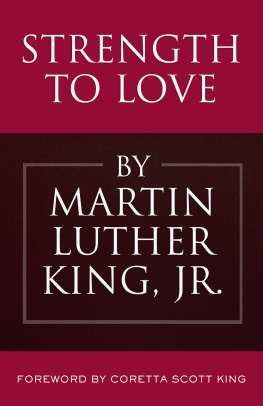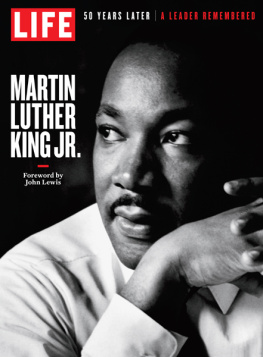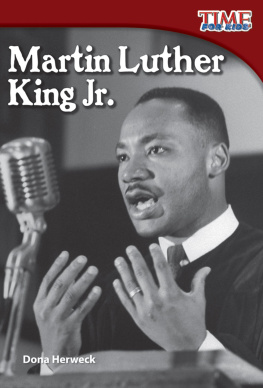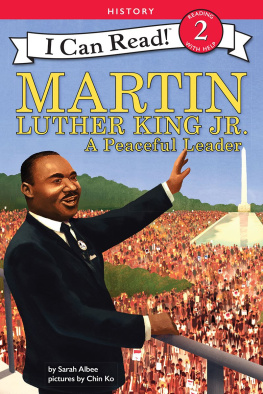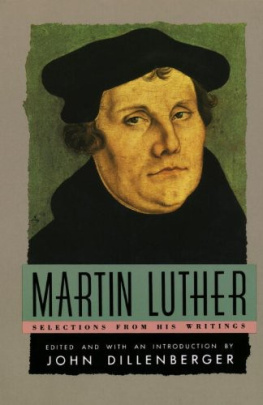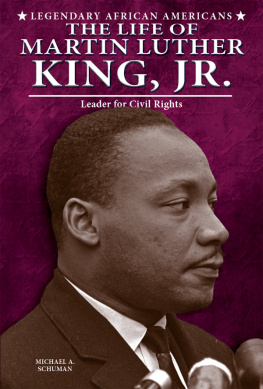Martin Luther King - Strength to Love
Here you can read online Martin Luther King - Strength to Love full text of the book (entire story) in english for free. Download pdf and epub, get meaning, cover and reviews about this ebook. year: 2019, publisher: Beacon Press, genre: Science. Description of the work, (preface) as well as reviews are available. Best literature library LitArk.com created for fans of good reading and offers a wide selection of genres:
Romance novel
Science fiction
Adventure
Detective
Science
History
Home and family
Prose
Art
Politics
Computer
Non-fiction
Religion
Business
Children
Humor
Choose a favorite category and find really read worthwhile books. Enjoy immersion in the world of imagination, feel the emotions of the characters or learn something new for yourself, make an fascinating discovery.
- Book:Strength to Love
- Author:
- Publisher:Beacon Press
- Genre:
- Year:2019
- Rating:4 / 5
- Favourites:Add to favourites
- Your mark:
- 80
- 1
- 2
- 3
- 4
- 5
Strength to Love: summary, description and annotation
We offer to read an annotation, description, summary or preface (depends on what the author of the book "Strength to Love" wrote himself). If you haven't found the necessary information about the book — write in the comments, we will try to find it.
Strength to Love — read online for free the complete book (whole text) full work
Below is the text of the book, divided by pages. System saving the place of the last page read, allows you to conveniently read the book "Strength to Love" online for free, without having to search again every time where you left off. Put a bookmark, and you can go to the page where you finished reading at any time.
Font size:
Interval:
Bookmark:

All Labor Has Dignity
A Time to Break Silence:
The Essential Works of
Martin Luther King, Jr., for Students
In a Single Garment of Destiny:
A Global Vision of Justice
The Essential Martin Luther King, Jr.
The Radical King
Stride Toward Freedom:
The Montgomery Story
Thou, Dear God:
Prayers That Open Hearts and Spirits
The Trumpet of Conscience
Where Do We Go from Here:
Chaos or Community?
Why We Cant Wait

TO MY MOTHER AND FATHER
whose deep commitment to the Christian faith and unswerving devotion to its timeless principles have given me an inspiring example of the Strength to Love
I f there is one book Martin Luther King, Jr. has written that people consistently tell me has changed their lives, it is Strength to Love. I believe it is because this book best explains the central element of Martin Luther King, Jr.s philosophy of nonviolence: His belief in a divine, loving presence that binds all life. This belief was the force behind all of my husbands quests to eliminate social evil, and what he referred to when he preached of the interrelated structure of reality in his sermon The Man Who Was a Fool:
All men are caught in an inescapable network of mutuality, tied in a single garment of destiny. Whatever affects one directly affects all indirectly. I can never be what I ought to be until you are what you ought to be, and you can never be what you ought to be until I am what I ought to be.
Martin Luther King, Jr.s theological belief in the interdependence of all life inevitably led to methods for social change that dignified the humanity of the social change advocate as well as his adversary. Christ gave us the goals, he would often say, and Mahatma Gandhi provided the tactics.
It was in his first post as minister of the Dexter Avenue Baptist Church in Montgomery, Alabama, that Martin Luther King, Jr., first actively combined theology with social change. When the now-legendary 381-day nonviolent bus boycott began in 1955, Martin was chosen head of its organizing network, the Montgomery Improvement Association. Even then, Martins vision transcended time and place. He articulated for us not only the boycotts immediate goalthe desegregation of city busesbut, more importantly, showed us its ultimate goal of healing and regenerating an entire population:
The basic conflict is not really over the buses. Yet we believe that, if the method we use in dealing with equality in the buses can eliminate injustice within ourselves, we shall at the same time be attacking the basis of injusticemans hostility to man. This can only be done when we challenge the white community to reexamine its assumptions as we are now prepared to reexamine ours.
Noncooperation and nonviolent resistance were means of stirring and awakening moral truths in ones opponents, of evoking the humanity which, Martin believed, existed in each of us. The means, therefore, had to be consistent with the ends. And the end, as Martin conceived it, was greater than any of its parts, greater than any single issue. The end is redemption and reconciliation, he believed. The aftermath of nonviolence is the creation of the Beloved Community, while the aftermath of violence is tragic bitterness.
Even the most intractable evils of our worldthe triple evils of poverty, racism, and war which Martin so eloquently challenged in his Nobel lecturecan only be eliminated by nonviolent means. And the wellspring for the eradication of even these most economically, politically, and socially entrenched evils is the moral imperative of love. In his 1967 address to the antiwar group Clergy and Laity Concerned, he said:
When I speak of love I am not speaking of some sentimental and weak response. I am speaking of that force which all of the great religions have seen as the supreme unifying principle of life. Love is somehow the key that unlocks the door which leads to ultimate reality. This Hindu-Moslem-Christian-Jewish-Buddhist belief about ultimate reality is beautifully summed up in the first epistle of Saint John: Let us love one another; for love is God and everyone that loveth is born of God and knoweth God.
If love is the eternal religious principle, Martin Luther King, Jr., believed, then nonviolence is its external worldly counterpart. He wrote:
At the center of nonviolence stands the principle of love. The nonviolent resister would contend that in the struggle for human dignity, the oppressed people of the world must not succumb to the temptation of becoming bitter or indulging in hate campaigns. To retaliate in kind would do nothing but intensify the existence of hate in the universe. Along the way of life, someone must have sense enough and morality enough to cut off the chain of hate. This can only be done by projecting the ethic of love to the center of our lives.
Just as Martin Luther King, Jr., sought the integration of the eternal and the temporal, he sought the integration of the spiritual and the intellectual. In the sermon Love in Action he preached that one day we will learn that the heart can never be totally right if the head is totally wrong. Only through the bringing together of head and heartintelligence and goodnessshall man rise to a fulfillment of his true nature. To rise to this fulfillment, Martin believed, took not only the integration of the eternal and the temporal, or the spiritual and the intellectual but, most deeply, the integration of the visionary and the practical.
If Martin Luther King, Jr., was an apostle of love, he was no less an apostle of action. The fierce urgency of now stood as his cardinal impetus for social change. His friends and coworkers in the civil rights movement still joke about Martins seeming impatience at their extended, all-night discussions, which could bog down action itself. Then, Martin would tease about the paralysis of analysis. At heart, though, Martin was deadly serious. In The Trumpet of Conscience, he wrote:
In a world facing the revolt of ragged and hungry masses of Gods children; in a world torn between the tensions of East and West, white and colored, individualists and collectivists; in a world whose cultural and spiritual power lags so far behind her technological capabilities that we live each day on the verge of nuclear co-annihilation; in this world, nonviolence is no longer an option for intellectual analysis, it is an imperative for action.
And so we come full circle. The struggle to eliminate the worlds evilsevils so flagrant and self-evident that they glare at us from every ghetto street and rural hovelcan only occur through a profound internal struggle. By reaching into and beyond ourselves and tapping the transcendent moral ethic of love, we shall overcome these evils. Love, truth, and the courage to do what is right should be our own guideposts on this lifelong journey. Martin Luther King, Jr., showed us the way; he showed us the Dreamand we responded with full hearts. Martin was an optimist. I am too. I do believe that one day our strength to love shall bring the Dream to fruition and the Beloved Community to earth.
CORETTA SCOTT KING
January 1981
I n these turbulent days of uncertainty the evils of war and of economic and racial injustice threaten the very survival of the human race. Indeed, we live in a day of grave crisis. The sermons in this volume have the present crisis as their background; and they have been selected for this volume because, in one way or another, they deal with the personal and collective problems that the crisis presents. In these sermons I have sought to bring the Christian message to bear on the social evils that cloud our day and the personal witness and discipline required. All of these sermons were originally written for my former parishioners in the Dexter Avenue Baptist Church of Montgomery, Alabama, and my present parishioners in the Ebenezer Baptist Church of Atlanta, Georgia. Many of the sermons were later preached to congregations throughout the nation.
Font size:
Interval:
Bookmark:
Similar books «Strength to Love»
Look at similar books to Strength to Love. We have selected literature similar in name and meaning in the hope of providing readers with more options to find new, interesting, not yet read works.
Discussion, reviews of the book Strength to Love and just readers' own opinions. Leave your comments, write what you think about the work, its meaning or the main characters. Specify what exactly you liked and what you didn't like, and why you think so.

